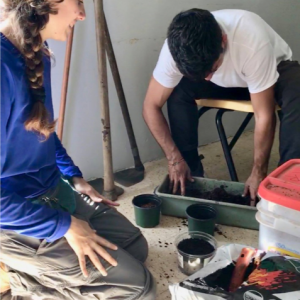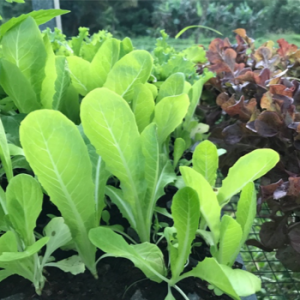When Adam is placed in the garden of Eden he is placed in relationship to the fertile soil for which he is named: he is to “till it and keep it,” if you read the NRSV, or to “work it and take care of it,” in the NIV, “work the ground and keep it in order” if you’re partial to Eugene Peterson’s Message, or “tend and watch over it” if you read the New Living Translation.
What on earth is he doing?
Two Hebrew verbs. One is abad, to “serve,” most literally, as a servant serves a master, or to “worship,” as a person does to God. It does have the rarer meaning of “to work” without an indication of for whom you work – but usually it indicates a service rendered by an inferior for a superior. My California soul is deeply delighted at the notion of our first ancestor “worshipping” the soil. And I’m also thrilled to see that there was a positive paradigm for a human’s labor rendered to the soil, before the fall and expulsion from Eden whereupon we are told “in toil you shall eat of [the fruit of the land] all the days of your life.
Two is shamar, to “watch,” most literally, to observe with one’s eyes, OR as a watchman watches over a castle, to keep, protect, or preserve. I respect and appreciate the idea of protecting and preserving the land, but there’s also the aspect of watching it that takes a learner’s eye – to learn what the land can do, what it needs, how it will react to rain and sun and tilling and any other interaction it may have.
Ellen Davis comes up with four words: when it comes to the land, Adam is to “work it and serve it, observe it and preserve it.” We must fall to our knees, learn from it, respect its limitations, appreciate its art, marvel at its wonders, protect them from harm. This is our call.
(Scripture, Culture, Agriculture: An Agrarian Reading of the Bible. p. 30)
Read more »
 This is the second part of a two-part series on Puerto Rico, Climate Change and Food. Part one can be found here. “Back to the Land” and Agroecology Jesús Vázquez Negron and I visited Ian Pagán Roig at Finca (farm) Josco Bravo in Toa Alta, Puerto Rico, which is one of the three sites at… Read more »
This is the second part of a two-part series on Puerto Rico, Climate Change and Food. Part one can be found here. “Back to the Land” and Agroecology Jesús Vázquez Negron and I visited Ian Pagán Roig at Finca (farm) Josco Bravo in Toa Alta, Puerto Rico, which is one of the three sites at… Read more »
 This is the second part of a two-part series on Puerto Rico, Climate Change and Food. Part one can be found here. “Back to the Land” and Agroecology Jesús Vázquez Negron and I visited Ian Pagán Roig at Finca (farm) Josco Bravo in Toa Alta, Puerto Rico, which is one of the three sites at… Read more »
This is the second part of a two-part series on Puerto Rico, Climate Change and Food. Part one can be found here. “Back to the Land” and Agroecology Jesús Vázquez Negron and I visited Ian Pagán Roig at Finca (farm) Josco Bravo in Toa Alta, Puerto Rico, which is one of the three sites at… Read more »
 Overview In December, I participated in a delegation comprised of staff from Presbyterian Disaster Assistance (PDA), Presbyterian Self-Development of People (SDOP), and Special Offerings, and we invited local pastors and mid-council staff to join us for the visits to Fideicomiso de la Tierra, a decimated family farm in Lares, and Presbyterian Camp Guacio over the course of…
Overview In December, I participated in a delegation comprised of staff from Presbyterian Disaster Assistance (PDA), Presbyterian Self-Development of People (SDOP), and Special Offerings, and we invited local pastors and mid-council staff to join us for the visits to Fideicomiso de la Tierra, a decimated family farm in Lares, and Presbyterian Camp Guacio over the course of…  ONCE UPON A TIME… a precious planet called Earth was tousled by ferocious disasters, more and more each year! Epic fires, hurricanes, floods and droughts uprooted lives and destroyed nature along with the many edifices built by humans. The faith of the religious was tested, as damage, deluges and death brought to mind the story in…
ONCE UPON A TIME… a precious planet called Earth was tousled by ferocious disasters, more and more each year! Epic fires, hurricanes, floods and droughts uprooted lives and destroyed nature along with the many edifices built by humans. The faith of the religious was tested, as damage, deluges and death brought to mind the story in…